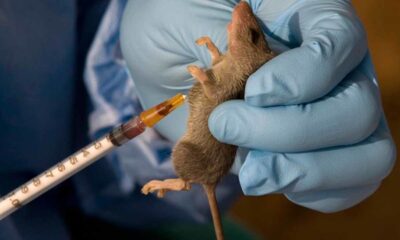Health
NCDC Reports Significant Lassa Fever Outbreak: 506 Cases and 95 Fatalities
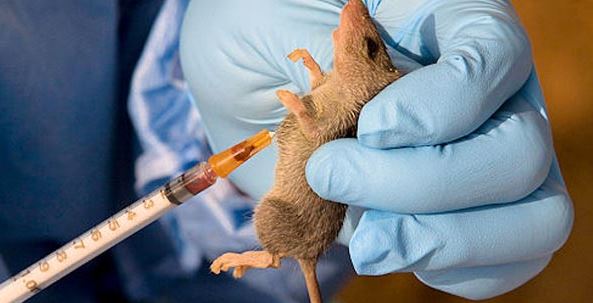
On Wednesday, the Nigeria Centre for Disease Control and Prevention (NCDC) issued a concerning update revealing that there have been 506 confirmed cases of Lassa fever, alongside 2,492 suspected cases, resulting in a total of 95 reported deaths as of February 23, 2025. This alarming situation has prompted widespread public health efforts to combat the disease.
The weekly situation report for the eighth epidemiological week highlights the transmission of Lassa fever across 12 Nigerian states and 70 local government areas, culminating in a case fatality ratio (CFR) of 18.8 percent. The distribution of confirmed cases is as follows: Ondo state leads with 160 cases, followed by Bauchi with 122, and Edo with 88 cases. Additional cases have been detected in Taraba (80), Ebonyi (15), Kogi (14), Gombe (11), Plateau (7), Benue (5), Nasarawa (2), Delta (1), and Cross River (1).
Lassa fever is a zoonotic disease that typically surfaces during the dry season in Nigeria. It is primarily transmitted through contact with the excreta or urine of the common African rat, known scientifically as the Mastomys rat species, which is prevalent in various regions. The disease manifests through a spectrum of symptoms, including fever, weakness, and, in severe cases, hemorrhaging.
In the report, it was noted: “During week eight, the number of new confirmed cases surged to 54, a notable increase from 38 cases reported in the previous week, week seven of 2025. These new cases were predominantly documented in Bauchi, Ondo, Edo, Taraba, Ebonyi, Plateau, Benue, and Kogi states, underscoring the need for intensified surveillance and response measures.”
As of week eight in 2025, a cumulative total of 95 deaths has been recorded, maintaining an unchanged case fatality rate of 18.8 percent when compared to the same timeframe last year, 2024.
The report also provides insight into the demographics of those affected, revealing that a significant 73 percent of confirmed cases emerged from just three states—Ondo accounted for 32 percent, Bauchi 24 percent, and Edo 17 percent. This concentration of cases emphasizes the urgent need for targeted intervention in these regions.
Furthermore, the most affected age group is individuals aged 21 to 30 years, with an age range spanning from as young as 1 year to as old as 94 years, and a median age of 30 years. The gender distribution among confirmed cases shows a male-to-female ratio of approximately 1:0.8, reflecting a slight predominance of male cases.
In a notable development, the report indicates that the total number of suspected cases has decreased compared to the same period in the previous year, 2024, suggesting potential improvements in disease control efforts.
Additionally, the health sector remains vigilant, as one healthcare worker has also been reported among the affected during week eight. To effectively coordinate the national response to this outbreak, the multi-partner, multi-sectoral Lassa fever Incident Management System has been activated, striving to streamline efforts and resources across all levels of government and health services.
These collective efforts underscore the importance of public health initiatives and community awareness in combating Lassa fever and mitigating its impact on Nigerian society.
Health
Nigeria Struggles to Meet Exclusive Breastfeeding target
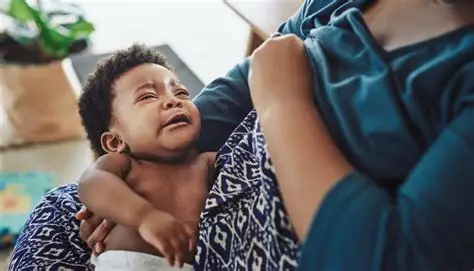
- UNICEF Advocates for Breastfeeding Rights of Displaced Families
- Abia State Reaffirms Commitment to Paid Maternity and Paternity Leave
The United Nations Children’s Fund (UNICEF) has emphasized the importance of enhancing government and community support to protect the well-being of nursing mothers who are facing significant challenges due to conflict and displacement. The organization highlighted that infants born in such circumstances should not be denied their fundamental right to adequate nutrition and care.
Stressing the need for immediate psychological, nutritional, and social protection interventions, UNICEF called for comprehensive measures to ensure that breastfeeding practices are maintained, even in crisis situations.
During an event marking World Breastfeeding Week, Muhammad Okorie, UNICEF’s Social Policy Manager, underscored the vital role of breast milk in delivering essential nutrients and hydration to infants, debunking myths that suggest the need for supplementary water or alternatives.
Meanwhile, Priscilla Otti, the wife of the Abia State Governor, reiterated the state government’s commitment to providing six months of paid maternity leave for nursing mothers and three weeks of paternity leave for fathers to foster bonding with their newborns.
She made these statements while launching the state’s 2025 World Breastfeeding Week celebrations in Umuahia, the capital of Abia State. Otti noted that the government aims to exemplify mother-friendly workplace policies, including the establishment of crèches in both public and private sectors, starting at the state High Court headquarters and the state secretariat in Umuahia.
Additionally, while inaugurating a completed crèche in Umuahia, Mrs. Otti expressed her joy in being part of the initiative and stated that she provided the furnishings and equipment to ensure the space is functional, welcoming, safe, and nurturing for the children.
Credit: The Guardian
Health
Nurses call off nationwide strike

The industrial action initiated by the National Association of Nigerian Nurses and Midwives (NANNM) has officially been called off, as confirmed by Health Minister Ali Pate. In a press conference held after a closed meeting on Friday, Pate stated that the suspension followed successful negotiations with the association’s leadership.
Despite the resolution, the union representatives chose not to speak to the press after the discussions. Members of the association had started a warning strike on July 29, 2025, in response to the government’s lack of action following a 15-day ultimatum delivered on July 14. This strike, which affected federal health institutions across the country, was originally planned to continue until August 5.
The strike was prompted by dissatisfaction regarding inadequate welfare and working conditions for nurses. The association has been advocating for enhanced welfare packages, fair allowances, and improved work environments. Earlier, NANNM National Chairman Morakinyo Rilwan accused the Federal Government of neglecting to engage with the association during the negotiation process, emphasizing the lack of communication from the government.
Rilwan stated, “As far as we are concerned, there has been no communication from the government up to this moment. That is why we are saying the strike is on, and nothing is stopping it. Even if the government calls today or tomorrow, it won’t halt the strike. They had sufficient time.”
The demands put forth by the association include an increase in shift allowances, adjustments to uniform allowances, the establishment of a unique salary structure for nurses, increased core duty allowances, large-scale recruitment, and the creation of a dedicated nursing division within the Federal Ministry of Health. Rilwan pointed out that the decision to strike was not solely made by the leadership but also expressed the frustration of members regarding the long-standing neglect of their issues.
Health
Lagos Doctors Initiate Three-Day Warning Strike Over Salary Issues

Government: We Are Addressing the Concerns
Medical doctors employed by the Lagos State Government are set to commence a three-day warning strike today to protest what they consider “unlawful and disrespectful” salary deductions made by the state.
The strike, announced by the Medical Guild, which represents medical and dental professionals in the public sector of the state, will start at 8 a.m. and conclude at the same time on Thursday.
During a press conference held at the Guild’s headquarters in Lagos, Chairman Dr. Japhet Olugbogi stated that the decision came after multiple unsuccessful attempts to resolve the issue through dialogue.
He explained that the conflict initiated in April when the state government deducted a portion of doctors’ salaries without consultation. While these deductions were later reversed after significant intervention and strategic discussions, a new round of deductions occurred in July, “this time without any prior warning or justification.”
The doctors have outlined their main demands, which include the prompt reversal of the July salary deductions and the complete payment of the 12-month revised Consolidated Medical Salary Structure (CONMESS) arrears owed to honorary consultants at the Lagos State University Teaching Hospital (LASUTH).
As of the latest updates, the Lagos State Government had not yet provided an official response to the doctors’ planned strike action.
In response to the Medical Guild’s concerns, the Ministry of Health has stated that the government is actively reviewing “all grievances of the doctors with the utmost sincerity and urgency.”
“Negotiations and discussions with the Medical Guild are ongoing,” reported Mr. Tunbosun Ogunbanwo, the ministry’s Director of Public Affairs, in a statement last night.
The statement elaborated: “This is the first occurrence of such a situation in recent years, and the government is particularly focused on the welfare, motivation, and productivity of all healthcare workers within the state.
“A conciliation committee, consisting of representatives from both the Medical Guild and the government, was previously established to address all outstanding concerns. Meetings have taken place, and the documents submitted by the Guild are currently under careful review in accordance with existing policies and fiscal regulations.
“As a responsible government, we greatly appreciate the crucial role our healthcare professionals play in providing quality and timely health services to over 20 million residents in Lagos State. We urge the Medical Guild to maintain a dialogue-centric approach while we strive for a peaceful and equitable resolution that serves all parties, especially the residents who could suffer from any disruption in services.”
The Lagos State Ministry of Health therefore requests that the Medical Guild reconsider its warning strike and allow ongoing discussions to reach a successful conclusion. Governor Babajide Olusola Sanwo-Olu is committed to enhancing the welfare of healthcare workers and ensuring harmony within the health sector.
“We appreciate the patience and understanding of the citizens of Lagos and assure the public that contingency plans are being established to minimize any impact on healthcare services during this period.”
-

 News10 months ago
News10 months agoNUJ FCT Council Mourns The Loss of Senior Journalist, Isaiah Abraham
-

 News10 months ago
News10 months agoHURIWA Declares Governor Fubara’s Emergence as Divine, Urges Support for Rivers State’s Progress
-

 News10 months ago
News10 months agoAnioma State as panacea to South-East marginalization – By Emmanuel Onwubiko
-

 Opinion8 months ago
Opinion8 months agoNIGERIAN WOMAN IN DIASPORA, CULTURAL SHOCKS – By Stacey Ukaobasi Onwuegbuchulam
-
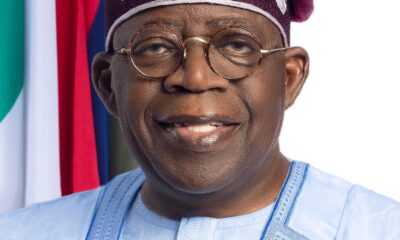
 News11 months ago
News11 months agoHURIWA Blames Serial Stampedes on Weaponized Poverty, Warns of Nigeria’s Rapid Decline
-

 News10 months ago
News10 months agoJealous Husband Stabs Nigerian Bishop To Death Over Suspicion Of Sleeping With Estranged Wife
-

 News10 months ago
News10 months agoTinubu sympathizes with ex-speaker Bankole on the death of his mother
-
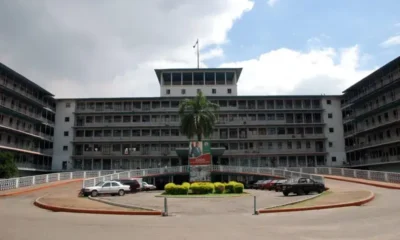
 Health8 months ago
Health8 months agoA complete list of 154 healthcare facilities across Nigeria that provide free emergency obstetric care and VVF (Vesico-Vaginal Fistula) surgeries.




